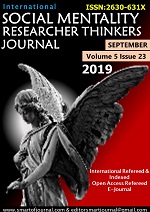Author :
Abstract
Bu çalışma baba izleği, Kafkaesk anlatım tutumu ve yabancılaştırma efektinin beş çeviri eserde kelime ve cümle aktarımlarına etkisini inceler. Otorite yabancılaşmayı, tepkiyi ve alayı getirmiştir. Edebi eserin dil, biçem, karakter gibi yapı unsurları öyküyü yönlendirir. Onların birbirleri arasındaki ilişki tematiği, anlatının ağırlığını ve olay örgüsünü şekillendirir. Dönüşüm Öyküsü’nün görünmeyen karakteri baba, katı ve sıkı bir model oluşuyla önemli bir izlektir. Onun oğul Samsa üzerindeki hegemonyası, ben-anlatıcının sözleriyle belirgindir. Anlatıcının aşağılanmışlığı ve yabacılaşmışlığı, bastırılmışlığı sürekli hissettiği güce dayanır. Baba oğul arasındaki olumsuz ilişkisi Kafkaesk tavrı güçlendirmiş; baba otoritesinden kaynaklanan eziklik ve ruhsal bozukluk edebi eserin çevirisini zorlaştırmıştır. Öykünün yeni çevirilerinde bu travmaların dikkate alınması gereklidir.
Keywords
Abstract
This study examines the effect of father watching and Kafkaesk narrative attitude on word and sentence transfers in five translated literal works. Authority has brought alienation, reaction and irony. The structural elements of the work, such as language, style and character, direct the story. Their relationship shapes thematic, the narrative's weight and plot. The father who is the invisible character of the Transformation Story is an important trajectory of being a strict and hard model. His hegemony over the son Samsa is evident in the words of the self-narrator. The narrator’s humiliation, alienation and repression are based on the power he feels constantly. The relationship between father-son has strengthened the Kafkaesque narrative attitude; underestimate and mental disorder caused by the authority made the translation of the literary work difficult. These traumas should be taken into account in the new translations of the story.
Keywords
- Alkan, H. (1995). Değişim, (Alm. Çev. Hakan Alkan), İstanbul, Ada Yayınları, Birinci Basım.
- Alkan, H. (1995). Değişim, (Alm. Çev. Hakan Alkan), İstanbul, Ada Yayınları, Birinci Basım.
- Altıparmak, İ. B.; Drakoğlu, A. (2016). “Franz Kafka’nın ‘Dönüşüm’ Adlı Eserinin SosyolojikAçıdan Analizi”, Abant İzzet Baysal Üniversitesi Sosyal Bilimler Enstitüsü Dergisi, Yıl. 16, Cilt. 16, sayı. 2 (16). 171-184.
- Aktaş, T. (2001). “Kafka’nın ‘Die Verwandlung’ Adlı Öyküsünün Çevirileri Üzerine Bir İnceleme”, Gazi Üniversitesi Gazi Eğitim Fakültesi Dergisi, Cilt. 21, Sayı. 1. 33-46.
- Can, Ö. (1998). “Franz Kafka ve Çeviribilim Uygulamaları Açısından Dönüşüm Öyküsü’nün Türkçe’ye Yapılan Çevirilerinin Analizi”, Anadolu Üniversitesi Sosyal
- Cemal, A. (2014). Dönüşüm, (Alm. Çev. Ahmet Cemal), İstanbul, Can Sanat Yayınları, 46. Basım, Aralık.
- Cemal, A. (1996). Dönüşüm, (Alm. Çev. Ahmet Cemal), İstanbul, Can Yayınları, 7. Basım, Aralık.Demirezen, M. (1991). “Çeviride Kayıplar Sorunu”, Çağdaş Çeviri Kuramları ve UygulamalarıSeminerlerinde Sunulan Bildiriler (12-13 Nisan 1990, Ankara Hacettepe Üniversitesi YDYO. Mütercim-Tercümanlık Bölümü.
- Doğan, M. (1978). “Serbest Çeviri Üzerine”, Türk Dili Dergisi-Çeviri Sorunları Özel Sayısı, Sayı. 322, Ankara, TDK Yayınları. 49-54.
- Eser, E. (2017). Kafkaesk Nedir?, (Bkz. https://www.wannart.com/kafkaesk) ; (Erişim. 20.06.2019)Gelen, A. (2003). Değişim, (Alm. Çev. Arif Gelen), İstanbul: Sosyal Yayınlar, Birinci Baskı, Ocak. Gelen, A (1967). Değişim, (Alm. Çev. Arif Gelen), İstanbul, Varlık Yayınları.
- Gökberk, Ü. (1980). “Yorumsama Kuramı Açısından Yazın Eleştirisi”, Dilbilim ve Dilbilgisi Konuşmaları I, Ankara, Türk Dil Kurumu Yayınları.
- Göktürk, A. (1997). Okuma Uğraşı, İstanbul, Yapı Kredi Yayınları.
- Günyol, V. (1973), Değişim, (Alm. Çev. Vedat Günyol), İstanbul, Ataç Kitabevi, Dördüncü Basım.Kafka, F. Deutsche Literatur von Lessing bis Kafka, Prosa aus dem Nachlaẞ, Brief an den Vater, (Vergl.Kafka-GW Bd. 7.)
- Kafka, F. (2016). Babaya Mektup, (Alm. Çev. Güven Göktan Uçer), İstanbul, Öteki Yayınevi, 2. Baskı.
- Kafka, F. (2014). Dönüşüm, İstanbul, Türkiye İş bankası Yayınları.
- Kafka, F. (1995). Sevgili Milana Mektuplar, (Alm. Çev. Adalet Cimgöz), İstanbul: Say Yayınları.
- Kafka, F. (1967). ‘Die Verwandlung’, Erzählungen, Frankfurt am main: Fischer Taschenbuch Verlag.
- Kaplan, M. (1991). “Çeviride Kayıplar Sorunu”, Hacettepe Üniversitesi, Çeviribilim ve Uygulamaları Dergisi, Sayı. 1. 115-128.
- Muir, W. E. (1984). “Kafka’yı Çevirirken”, (İng. Çev. Serap Avanoğlu), Yazko Çeviri Özel Sayısı, İstanbul, Cem Yayınevi.
- Ritzer, G. (2014). Klasik Sosyoloji Kavramları, (Çev. H. Hülür), Ankara, De Ki Basım-Yayım.
- Sarı A. (2011). “Orhan Pamuk’un ‘Babamın Bavulu’nda, oğuz Atay’ın ‘Babama Mektubu’nda,Franz Kafka’nın ‘Babaya Mektup’unda Baba İzleği”, Atatürk Üniversitesi Türkiyet Araştırmaları Enstitüsü Dergisi, 45.
- Sokel, W. H. (1976). Franz Kafka-Tragik und Ironie, Fische Taschenbuch Verlag GmbH, Frankfurt am Main.
- Şipal, K. (1996). Değişim, (Alm. Çev. Kamuran Şipal), İstanbul, Cem Yayınevi.
- Tükel, İ. (2012). “Moder Örgütlerde Yabancılaşma ve Kafka’nın ‘Dönüşüm’ Romanının Bu Bağlamda Analizi”, Dokuz Eylül Üniversitesi Edebiyat Fakültesi Dergisi, 2 (1). 34-50.
- Walser, M. (1984). “Günümüz Gerçekliği ve Kafka”, (Çev. Tezer Özlü Kıral), İstanbul, Cem Yayınevi, Yazko Çeviri Özel Sayısı.
- Zengin, B. (1994). “Kafka’nın Değişim Çevirisi Üzerine”, Cumhuriyet Üniversitesi Sosyal Bilimler Enstitüsü Dergisi, Sayı. 17.
- “Franz Kafka-Dönüşüm-Çeviri Eser’, Mülakat, (24.06.2019), Kültürpark-Konya.https://www.sozunenguzeli.com/unlu-sozleri/franz-kafka; (Erişim. 20.06.2019)
